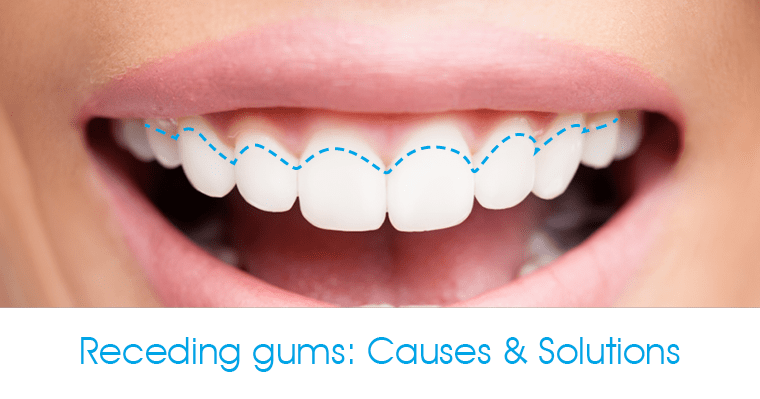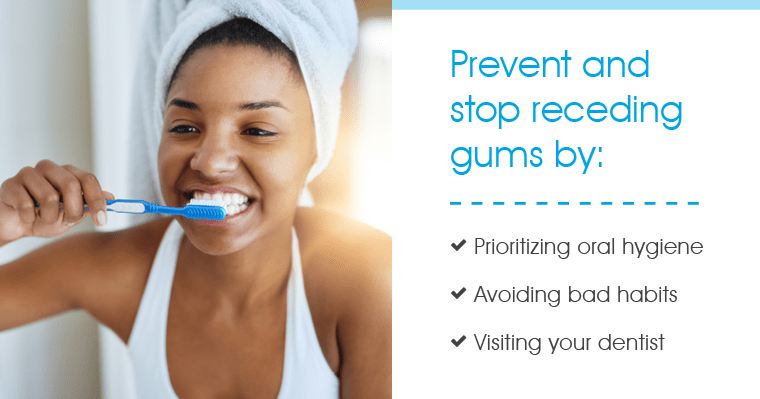Receding gums refers to gum tissue that has begun to pull away from the tooth structure, thus exposing more of the tooth and tooth root. What causes gum recession? Should you be alarmed if it happens to you? And can receding gums be fixed?
Left untreated, gum recession could make the tooth root or even bone tissue completely vulnerable—risking damage to the tooth nerve, losing the tooth, or a more severe infection! In this article, we’ll discuss the causes, symptoms, and real solutions for the condition known as receding gums.
What causes receding gums?
As with any condition, many factors can contribute to receding gums.
Periodontal disease takes home the first place prize of what causes receding gums. This spreading infection of the gingivae slowly eats away at your healthy gum and bone tissue.
Brushing your teeth too hard or too much can cause your gums to recede, according to the Journal of Periodontology.
Inadequate oral hygiene contributes to bad bacteria and plaque buildup—which destroy your gums.
Hormonal changes, such as those occurring during puberty, pregnancy, and menopause, can make your gum tissues more vulnerable to recession. The use of birth control hormones may also have a similar effect.
Tobacco users usually have more plaque buildup that hurts gums. Smokeless tobacco can irritate your gums, causing gum (periodontal) disease. To enhance the flavor of smokeless tobacco, sugar is often added, increasing the risk of tooth decay.
Grinding your teeth or a misaligned bite can cause irregular wear patterns on your gums and teeth, resulting in gum recession in the affected areas.
Certain medications or medical conditions can also inflame your gums or cause them to be more susceptible to periodontal disease.
How can you tell if your gums are receding?
Now that we know what causes receding gums, what should you do if you suspect your gums are pulling away? Only a qualified dental professional can properly diagnose and help you treat the condition. Healthy gums are a nice healthy pink color and the gum line looks consistent around all your teeth. If your gums are receding, you will likely begin to notice:
- Gums that are pulling away from the tooth
- Teeth appear to be longer than others
- Swollen gums
- Pockets or gaps between teeth
- Reddish or bleeding gums when brushing or flossing
- Pain and discomfort
- Teeth that are becoming loose
How can you fix receding gums?
Do you experience any of the above symptoms? Since gum tissue does not grow back, you need to talk with your dentist about personalized ways you can prevent gingival recession and stop gums from receding further. If you have gum disease, your gums and bone structure may put up a good fight against this progressive issue, but they cannot win the battle without help from a qualified oral health expert!
Depending on the amount of damage caused by gum disease, you may be able to get a deep cleaning and antibiotics to help clear out the infection and harmful bacteria. For more advanced cases, surgery or tissue grafting will be needed to regenerate the damaged gum and bone structures.
Remember that gum disease is not the only cause of receding gums. Preventive measures such as aligning your bite, using a custom night guard, quitting smoking, and treating cavities early on will help prevent damage to your precious smile!
You can fight gum recession!
You can prevent gum disease by brushing and flossing at least twice a day, attending regular cleanings and checkups with your dentist twice a year, and eating a well-balanced and healthy diet. We might say this a lot, but prevention is key. Simply knowing what causes receding gums won’t solve the problem. If you suspect your gums are receding, you should contact your dentist immediately to find out the cause of receding gums and prevent further damage.
Healthy gums are the foundation for a healthy smile, so taking care of your gums is tantamount to taking care of your pearly whites!
The content on this blog is not intended to be a substitute for professional medical advice, diagnosis, or treatment. Always seek the advice of qualified health providers with questions you may have regarding medical conditions.



